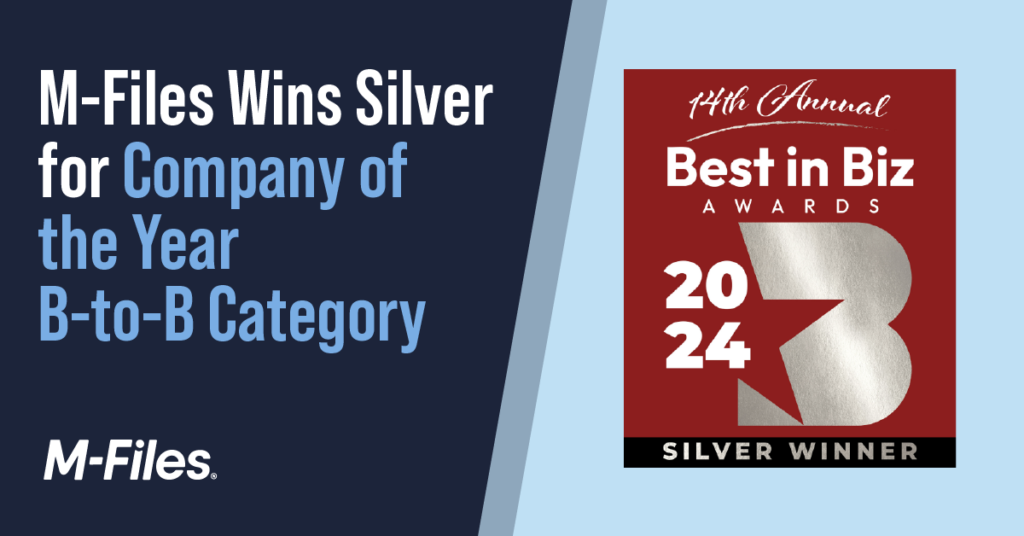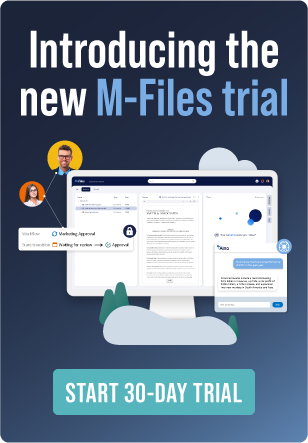Ditch the Paper Chase: Streamlining HR with Digital Transformation

Whether it’s content created internally or documents and files received from customers, partners, and suppliers, businesses today are drowning in a sea of information that grows bigger each day.
The Cost of Paper-Based HR
In particular, the HR department must manage and control a large volume and variety of information that is often highly confidential. Employee records, contracts of employment, payroll information, and learning requirements barely scratch the surface when it comes to the plethora of information and related processes managed by the HR department. Yet how much time are HR professionals spending trying to find and manage this information rather than concentrating on managing the process of hiring and training employees?
Paper, Folders, and Filing Cabinet Chaos
M-Files conducted a survey of 100 UK-based decision-makers, from companies with more than 50 employees, to better understand how HR departments are coping with managing such vast amounts of information.
HR Staff Can’t Find the Information They Need
According to the survey findings, quite simply, many are not coping effectively.
Of the HR decision-makers questioned, 41% waste over 10 minutes a day searching for the documents and information they need to carry out their jobs. Of those people, almost half actually spend more than 20 minutes!
Clearly, this is a hugely inefficient use of time, but what is driving this wasted time spent looking for information?
HR Departments Are Still Wedded to Paper
65% of people surveyed admit that HR information is still managed using paper documents, paper-based processes, and stored in filing cabinets. In fact, when it comes to managing HR information, paper is the go-to method, used more than any other approach or solution! It’s no surprise that HR departments are having such problems finding, sharing, and updating information.
In addition, 47% use files and folders on network drives. With 65% of respondents managing HR information in more than one location, it’s no surprise that finding information becomes even more challenging. Not to mention the risk of duplicate information being stored across multiple systems or locations, which makes it challenging to ensure you are using the latest and most up-to-date version.
Streamlining HR Processes with Digital Solutions
We also asked respondents about the typical HR processes that they found to be the most inefficient. The top three identified were:
- Employee reviews, remuneration, and benefits administration
- Posting job vacancies and managing applications
- Interviews and onboarding of new employees
Given the heavy use of paper, it’s no wonder that HR departments are finding their manual-based processes time-consuming and inefficient. By digitizing these processes and automating manual activities as much as possible, HR can free up vast amounts of time, enabling them to work more efficiently.
Boosting Efficiency with Digitization & Automation
80% of respondents admit to using a paper-based process for documents that require approval via signatures (for example, employee contracts and offer letters). Many HR professionals find hiring and onboarding new employees such an inefficient process, but by implementing electronic signatures, these processes could be vastly improved, streamlined, and automated. Not only would this save time, but it would also improve auditability and compliance.
Improved Compliance & Auditability
The problem with manual HR processes was further emphasized as we asked, “What are the biggest challenges with your role?”
Manual document processing was the top response with 44% of HR decision-makers citing that the printing, scanning, and hand-signing of documents — along with emailing documents and moving information to reside in different locations — was particularly challenging. In addition, 41% of those surveyed struggle with managing paper and filing.
Ready to streamline your HR processes and go paperless? Schedule a free demo or start your free trial today!





